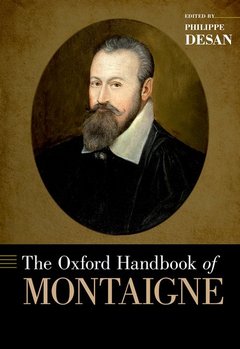The Oxford Handbook of Montaigne Oxford Handbooks Series
Langue : Anglais
Coordonnateur : Desan Philippe

In 1580, Michel de Montaigne (1533-1592) published a book unique by its title and its content: Essays"R. A literary genre was born. At first sight, the Essays resemble a patchwork of personal reflections, but they engage with questions that animate the human mind, and tend toward a single goal: to live better in the present and to prepare for death. For this reason, Montaigne's thought and writings have been a subject of enduring interest across disciplines. This "Handbook brings together essays by prominent scholars that examine Montaigne's literary, philosophical, and political contributions, and assess his legacy and relevance today in a global perspective. The chapters of this Handbook offer a sweeping study of Montaigne across different disciplines and in a global perspective. One section covers the historical Montaigne, situating his thought in his own time and space, notably the Wars of Religion in France. The political, historical and religious context of Montaigne's Essays requires a rigorous presentation to inform the modern reader of the issues and problems that confronted Montaigne and his contemporaries in his own time. In addition to this contextual approach to Montaigne, the Handbook also establishes a connection between Montaigne's writings and issues and problems directly relevant to our modern times, that is to say, our age of global ideology. Montaigne's considerations, or essays, offer a point of departure for the modern reader's own assessments. The Essays analyze what can be broadly defined as human nature, the endless process by which the individual tries to impose opinions upon others through the production of laws, policies or philosophies. Montaigne's motto -- "What do I know?" -- is a simple question yet one of perennial significance. One could argue that reading Montaigne today teaches us that the angle defines the world we see, or, as Montaigne wrote: "What matters is not merely that we see the thing, but how we see it."
Philippe Desan is Howard L. Willett Professor of French Literature and History of Culture at the University of Chicago. Among his most recent books are Montaigne: A Life (Princeton University Press, 2016), Bibliotheca Desaniana: Catalogue Montaigne (Classiques Garnier, 2011), and Montaigne: Les formes du monde et de l'esprit (Presses de l'Université Paris-Sorbonne, 2008). He edited the Essays of 1582 (2005), the Bordeaux Copy of the Essays (2002), and Montaigne's Travel Journal (2014), and is the general editor of Montaigne Studies. lit171518
Date de parution : 12-2016
Ouvrage de 840 p.
24.9x17.5 cm
© 2024 LAVOISIER S.A.S.



